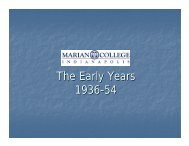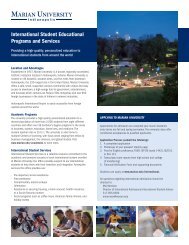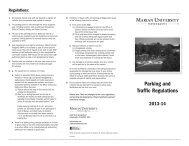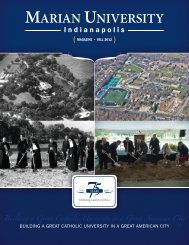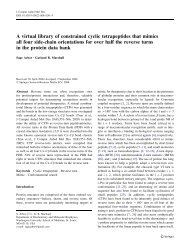2009-11 Marian University Course Catalog, fall 2010 edition
2009-11 Marian University Course Catalog, fall 2010 edition
2009-11 Marian University Course Catalog, fall 2010 edition
You also want an ePaper? Increase the reach of your titles
YUMPU automatically turns print PDFs into web optimized ePapers that Google loves.
completion of this course prepares students to enroll in 498.<br />
(SEM)<br />
PSY 498<br />
Directed Research II:<br />
Research Project 2 credits<br />
Prerequisites: 497 and/or instructor permission. Students<br />
complete the research project they began in 497 by gathering<br />
and analyzing data according to their proposal and reporting<br />
their findings with an APA-style manuscript and a formal<br />
presentation. Papers deemed to be of sufficient quality by<br />
the faculty sponsor may be presented at a regional research<br />
conference. (SEM)<br />
PSY 499<br />
Independent Study 1-3 credits<br />
Prerequisites: Junior or senior psychology major or minors<br />
and permission. Guided readings and a literature review are<br />
required on a psychological topic negotiated with the<br />
supervising faculty member. (SEM)<br />
SCI 101<br />
Earth Sciences 4 credits<br />
This course is an introduction to the earth sciences of<br />
geology, oceanography, meteorology, and astronomy. The lab<br />
portion includes recognition and basic experimentation using<br />
science inquiry skills and methods. Three lecture hours and<br />
two lab hours per week. This course partially satisfies the<br />
general education requirement in the scientific and<br />
quantitative understanding category. (FAL)<br />
SCI 102<br />
Life Sciences 4 credits<br />
This course is an introduction to the life sciences of biology,<br />
ecology, and environmental systems. The<br />
lab portion includes recognition and basic experimentation<br />
using science inquiry skills and methods. Three lecture hours<br />
and two lab hours per week. This course partially satisfies the<br />
general education requirement in the scientific and<br />
quantitative understanding category. (SPR)<br />
SCI 103<br />
Physical Sciences 3 credits<br />
This course is an introduction to the physical sciences of<br />
chemistry and physics for non-science majors, focusing on the<br />
physical laws related to motion, matter and energy,<br />
electricity, electromagnetic waves, and basic concepts of<br />
chemistry. This course partially satisfies the general<br />
education requirement in the scientific and quantitative<br />
understanding category. (SPR)<br />
SCI 104<br />
Physical Sciences Lab 1 credit<br />
Corequisite: 103. This lab portion of Physical Sciences<br />
involves the conduct of multiple experiments that illustrate<br />
the principles that are basic to physical science. Two lab<br />
hours per week. Taken in conjunction with SCI 103, this<br />
course partially satisfies the lab portion of the general<br />
education requirement in the scientific and quantitative<br />
reasoning category. (SPR)<br />
SCI 301<br />
Science and Health for<br />
the Elementary Teacher 3 credits<br />
This course explores science and health topics found in the<br />
elementary curriculum, including earth science—dinosaurs,<br />
volcanoes, earthquakes, weather, and astronomy; life<br />
science—Project Learning Tree, Project Wild, ecology, life<br />
cycles; health—body systems, nutrition, substance abuse,<br />
AIDS, sex education; and physical science—matter, atoms,<br />
electricity, magnets, energy, and machines. Lectures, handson<br />
laboratory experiences, and field work are included to<br />
acquaint the students with methods and techniques of<br />
science and health instruction. (SPR)<br />
SOC 100<br />
Experiential Learning:<br />
Community Service 1-2 credits<br />
Volunteer experience appropriate to the student’s interest at<br />
an approved site under the supervision of a field supervisor<br />
and monitored by a faculty member. Credit may apply toward<br />
the 128-credit degree total, but does not satisfy credits<br />
toward major, minor, or general education requirements.<br />
Department permission and coordination with the faculty<br />
experiential learning coordinator is required. May enroll for<br />
one or two credits. Enhancement courses, such as SOC 100,<br />
may be repeated for credit, with a maximum of 12 credits<br />
earned toward a bachelor degree or six credits toward an<br />
associate degree. Graded S/U. (SEM)<br />
SOC 101<br />
Introduction to Sociology 3 credits<br />
Introduction to the foundations of a science of society,<br />
evolution of social theory, group processes, the resulting<br />
social institutions and their effects on social behavior. This<br />
course partially satisfies the general education requirement<br />
in the individual and social understanding category. (SEM)<br />
SOC 145<br />
Introduction to Social Justice 3 credits<br />
An analysis of the origins of American social policy and<br />
legislation; the nature and goals of social justice; and the<br />
relationships among values, ideology, power, inequality,<br />
priorities in policy formation, and social change. (SPR)<br />
SOC 175<br />
Introduction to Anthropology 3 credits<br />
This course is a comprehensive introduction to anthropology<br />
that emphasizes the integration of the different fields of<br />
physical anthropology, archaeology, linguistics and cultural<br />
anthropology. The aim is to provide a sampling of<br />
anthropological research into human evolution and human<br />
cultures from the remote past to the present. This course<br />
125



